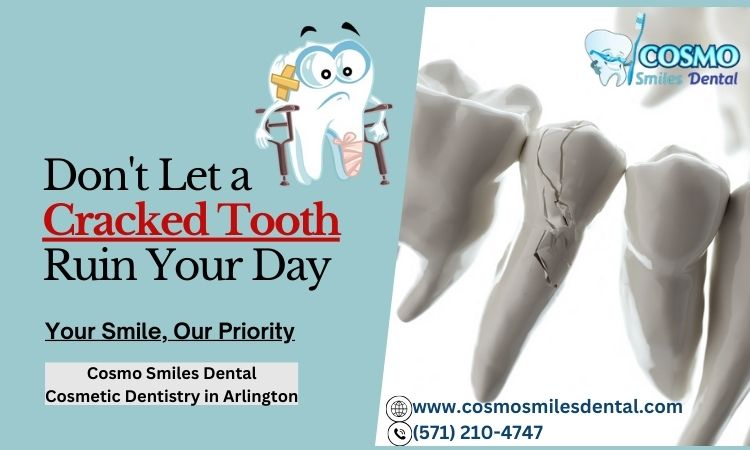A cracked tooth refers to any break or fissure in the tooth enamel, which can range from a small hairline fracture to a deeper, more severe crack. Cracks can occur due to several reasons such as biting on hard objects, trauma from an accident, or even teeth grinding (bruxism). Even seemingly minor cracks can cause discomfort if not addressed promptly.
The Risks of Leaving a Cracked Tooth Untreated
1. Increased Sensitivity and Pain
Untreated cracks often lead to tooth sensitivity, especially to hot or cold foods and beverages. Over time, the pain may become more frequent and intense as the crack widens or deepens.
2. Infection and Abscess Formation
A crack provides an entry point for bacteria, which can infect the pulp (the soft tissue inside the teeth). This infection may spread to surrounding gums and bones, leading to an abscess—a painful pocket of pus that requires immediate attention.
3. Tooth Decay
Bacteria entering the crack can lead to tooth decay beneath the enamel. Decay weakens the teeth further and complicates treatment options. A small crack can quickly escalate into a cavity or more severe dental issues.
4. Tooth Loss
Without treatment, the structural damage caused by a crack can lead to complete tooth breakage. When the crack extends past the gum line, it may render the tooth unsalvageable, thus requiring extraction and a suitable replacement.
5. Compromised Oral Health
An untreated cracked tooth doesn’t just affect the tooth itself. It might adversely affect neighboring teeth, gums, and the comprehensive health of the mouth. Chronic infections can spread to other parts of the body, causing severe health complications.

Symptoms of a Fractured Tooth
- Pain while chewing or biting: A fractured tooth often causes sharp, sudden pain when pressure is applied, especially when eating hard or crunchy foods.
- Sensitivity to temperature: You may experience heightened sensitivity to hot or cold food and drinks, which can be uncomfortable or painful.
- Visible cracks or chips: In some cases, the fracture may be noticeable, with visible cracks or chips in the enamel of the tooth.
- Discomfort around the gums: Swelling or tenderness around the affected tooth may occur, indicating irritation or infection.
- Intermittent or persistent pain: The pain may not be constant; it can come and go, often triggered by pressure or temperature changes.
- Difficulty identifying the source of pain: Sometimes, the pain might be vague or hard to pinpoint, as it can radiate to the surrounding areas, making diagnosis tricky without professional evaluation.
Treatment Options for a Cracked Tooth
The approach to treating a fractured tooth is determined by the extent of the damage to the tooth. Common treatments include:
- Dental Bonding: For small cracks, a resin is applied to bond the tooth back together, restoring its shape and function.
- Dental Crowns: For larger cracks, a dental crown is placed over the tooth to protect it from further damage and provide stability.
- Root Canal Therapy: If the crack reaches the pulp, a root canal may be required to remove the infected tissue and save the tooth.
- Teeth Extraction: In extreme cases where the crack has compromised the tooth beyond repair, extraction may be necessary, followed by a dental implant or bridge
Conclusion
If you suspect you have a cracked tooth, don’t wait for it to get worse. Prompt treatment at Cosmo Smiles Dental can help prevent pain, infection, and other complications that can arise from untreated cracks. Schedule an appointment with our dentist in Arlington or call us at (571) 210-4747 and protect your smile for years to come!
FAQs About Cracked Teeth
1. Can a cracked tooth heal on its own?
No, a cracked tooth requires professional dental care to prevent complications such as infection or further damage.
2. How can I tell if I have a cracked tooth?
Common signs of a cracked tooth include pain while chewing, sensitivity to temperature, or visible cracks. A dentist can confirm the diagnosis through an exam or X-ray.
3. What should I do if I suspect I have a cracked tooth?
If you suspect a tooth fracture or broken tooth, it’s important to schedule an appointment with a dentist immediately to avoid further damage and possible infections.
4. Are cracked tooth treatments expensive?
Treatment costs depend on the severity of the crack. Simple procedures like dental bonding are relatively affordable, while more complex treatments like root canals or extractions may be more costly. However, addressing a broken tooth early can prevent more expensive treatments later.
